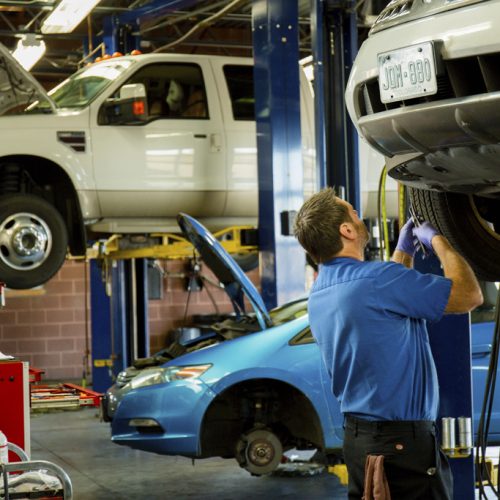So, you have a diesel or just purchased a new diesel truck! You might be wondering how does a diesel engine differentiate from a gasoline engine? The main difference is that a diesel engine uses compression in the combustion chamber to ignite the fuel instead of a spark like in a gasoline engine. Probably the last thing you thought of was the maintenance that is required to keep one of these “smokers” going and running reliably. The diesel truck maintenance can seem overwhelming, but the best thing to do is to stick to the manufacturer’s maintenance schedule.
Today’s diesels are more complex than ever. Due to emissions standards, increased horsepower, torque, and the technology required to keep them running optimally, the maintenance required has increased and is very important. Filters, filters and you guessed it, more filters, along with critical fluids. These fluids must be maintained in good condition and at adequate levels: specific Diesel engine oil, exhaust treatment fluid, power steering fluid, coolant, brake fluid, automatic transmission fluid, rear differential fluid. On 4×4’s, you also have transfer case fluid and front differential fluid.
Seems like a lot huh? Regular maintenance of these fluids and all the filters may seem costly, but in the long run, keeping up with this routine diesel truck maintenance can save you thousands of dollars in costly repairs. The maintenance schedules on your diesel can be found in your Vehicle’s Owner’s Manual. Our Service Advisors at Honest Accurate Auto Service can pull maintenance schedules specific to your diesel, and help you prioritize and budget for these maintenance services.
Roy, one of our diesel Master Technicians, changes the oil on his Ford F-250 every 3500 miles or every 200 hours of operation, whichever comes first. We recommend you do the same. This is an industry standard since many diesels (think ambulance trucks, work trucks) often sit and idle while someone is working. Just because these big rigs hold more oil doesn’t mean they can go longer between oil changes.
Also, diesels tend to generate more soot and acidic combustion “blow-by”, which means that the fuel/air mixture blows past the piston and into the crankcase). Turbochargers subject motor oils to high temperatures and therefore increase engine deposits. A turbo can spin at speeds exceeding 100,000 rpm (about the same speed as a dentist’s drill)!
When an engine is shut off, the heat inside the turbo bearing housing builds from the high frictional heat and hot exhaust gases. The oil in contact with these hot bearing surfaces can crack, forming coke (hard carbon deposits) and hydrogen. This can lead to bearing damage since the oil is no longer able to lubricate properly when you start the vehicle after a cold soak from sitting overnight or for much longer periods of time. They run at higher temperatures, under more pressure, and contaminate engine oil much easier than gas engines. Therefore, they require the frequent oil changes.
If you read the fine print in your car owner’s manual, you will see that the 7,500-mile oil change interval is for vehicles driven under “Normal or Ideal conditions”. What exactly are these ideal conditions? What are the consequences of following “Ideal” conditions guidelines, when the conditions are “not ideal” with respect to motor oil condition and engine wear? For instance, the following are examples of severe service driving; frequent short trips (especially during cold weather), stop-and-go driving, driving in dusty conditions (gravel roads, etc.), and high-temperature conditions. Under such conditions, the general recommendation found in owner’s manuals is to change the oil every 3,000 miles or six months.
Changing the engine oil more frequently is also good for all the seals inside the engine, as they are extremely expensive to replace once they begin to leak. Fresh oil helps to keep seals soft and pliable and doing what they are intended to do. Old oil becomes abrasive and can damage moving parts inside the engine. With a modern-day diesel engine replacement costing in the tens of thousands of dollars, it will save money in the long run to change your oil and oil filter on time, by an experienced technician.
One major service that is constantly overlooked and typically not thought of is changing the fuel filters on diesels. It’s crucial that the fuel being delivered to the injectors is clean and has no water or contaminants in it. The reason being is because the fuel pressure at the injectors can be upwards of 36,000 PSI and at this pressure, any water or contaminants in the fuel can act like a cutting tool and destroy the injector by widening the tip. One injector can cost anywhere from $200-800 dollars, and each diesel will have anywhere from 4 to 8 injectors depending on the engine. Replacing the injectors is also very labor intensive, because many injectors sit under the valve covers, which are difficult to access.
Changing your oil frequently can have a huge impact on the life of the injectors because some injectors are run by high pressure oil. Old, broken down oil can destroy the injector or cause them to stick and not run optimally. There are also fuel/water separators on diesels and some of them can be drained but it just depends on the make and model.
Since there are many considerations when doing routine maintenance on diesel, it is important to have an experienced diesel technician you can talk to and trust looking over your Ford Powerstroke, Chevy Duramax and Dodge Cummins! To that end, staying up to date on your diesel truck maintenance is imperative!




